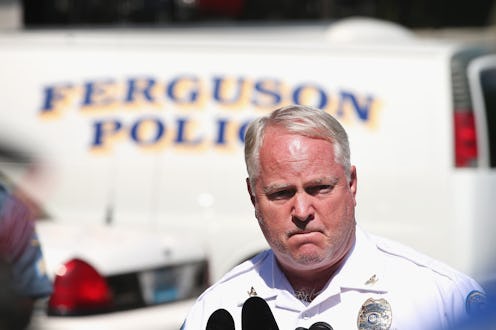News
Ferguson Chief Jackson Dodges DOJ Questions
For the past couple of days, the nation's collective gaze has once again turned to the city of Ferguson, Missouri. After the release of the Justice Department's damning report on the history of racist policing in the St. Louis county suburb, an apparent validation of what many members of the city's black community had been saying all along, everyone is looking for a simple answer: what's the next step? Well, whatever you do, don't ask the man in charge of the whole thing — Ferguson Police Chief Tom Jackson still needs to "analyze" the report, or at least that's what he told CNN's Sara Sidner Friday.
Of course, it's hardly a shock that Jackson flubbed a media appearance, much less one he wasn't prepared for. His performances in the aftermath of the fatal shooting of Michael Brown — contradicting himself, exposing sensitive information the DOJ urged him not to, and generally inflaming outrage — made it pretty clear that, however aggressively he wielded police power over the public of Ferguson, he wasn't ready for prime time on a national stage. And now, with his department's conduct (and thus, his own) squarely under the microscope, it's probably a safe bet that we're going to see more of him fumbling along as the cameras roll.
Sidner's impromptu Q&A with Jackson went as follows — and yes, it was pretty awkward. In fairness to Jackson, it can't be easy having an obviously adversarial interview sprung on you. But when you're the head of a police department found out for numerous instances of personal and structural racism, maybe you should come a little more prepared.
Sidner: Do you think the department has a race problem? Do they have a problem, and are you going to fix it? What are you going to do about it?
Jackson: I need to have time to really analyze this report, so I can't comment on it.
Sidner: Why do you need time to analyze the report? You should've known what was going on in your department, correct? ... What do you think of the DOJ's report?
Jackson: I'm still analyzing it.
Sidner: You're still looking at it? Don't you think you should've known some of the stuff that's come out? The racist emails, the numbers. Were you just trying to bilk people out of money instead of protecting them? Telling your department to just go ticket them?
Jackson: Okay, thank you. I'll be in touch, get ahold of Jeff.
Sidner: I've talked to everyone, I've given you literally every opportunity — we've been talking for days and days and days, all we want is an answer from you. What do you think of this DOJ report, and what are you going to do about it? Just any idea what it is you're going to do yourself, as the chief of the department.
Jackson: I'm going to analyze the report, and take action where necessary.
Sidner: Does that mean you're going to stay around?
Jackson: I'm going to take action where necessary.
Oof. Suffice to say, it wasn't exactly a open exchange of ideas. Sidner's questioning as to whether Jackson might resign is altogether apt, considering what was revealed by the DOJ report — a report he apparently hasn't quite finished processing, despite having ostensibly known more about his department from the get-go than any of us did.
Beyond even the grossly racist emails it uncovered, the DOJ report shone a light on the Ferguson PD's aggressive use of ticketing and arrests to raise money for the city, and how plainly black residents are targeted. Some of the examples are utterly harrowing, and beyond the boundaries of acceptable police work — despite accounting for just 67 percent of the city's population, black residents made up 93 percent of arrests from 2012 to 2014, as detailed by the Washington Post.
To put it bluntly, if Jackson is mulling over a possible resignation, I'll offer my own advice: Do it.
Images: CNN; Getty Images
